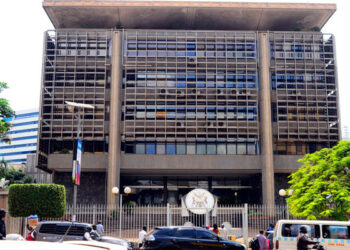South Africa has asked Rwanda to extradite two men suspected of murdering the former Rwandan intelligence chief Patrick Karegeya, in a move likely to sour relations between the two countries.
Lawyers in Johannesburg representing the family of Karegeya, whose body was found in the city’s Michelangelo hotel on New Year’s Day 2014, said South African prosecutors had informed them they had issued arrest warrants for Ismael Gafaranga, commonly known as Apollo, and Alex Sugira, who are both believed to be resident in Rwanda.
South Africa’s justice department is due to lodge extradition requests with authorities in the Rwandan capital, Kigali, and prosecutors will then apply to Interpol for red notices to be issued against the suspects. These provide Interpol’s member states with lists of internationally wanted individuals.
“This is fantastic news,” said Kennedy Gihana, a Rwandan lawyer who represents Karegeya’s family. “At last justice has prevailed. It can be 30 years or 40 years but these people will be prosecuted in the end.”
The decision to launch a formal extradition process injects new life into a case that has been a stain on Kigali’s international reputation and a five-year embarrassment for both governments involved.
Gerrie Nel, the head of Afriforum’s private prosecution unit, hailed the move as proof there had been a miscarriage of justice, pointing out that the warrants had been issued without any further investigation taking place.
Karegeya was a schoolmate and personal friend of Rwanda’s president, Paul Kagame, and rose to become head of external intelligence in Rwanda. He fled to South Africa in 2010 after serving prison time for insubordination. Gen Faustin Kayumba Nyamwasa, Rwanda’s former army chief of staff, later joined forces with him there, setting up the Rwanda National Congress, an opposition party in exile.
Rwanda’s government denounced the RNC as a terrorist organisation and has repeatedly asked Pretoria to send its members to Kigali to face trial – requests the South African authorities have ignored. Kayumba, who has survived repeated attempts on his life while in exile, is under 24-hour protection paid for by the South African state.
Rwanda’s high commissioner to Pretoria, Vincent Karega, said Kigali was not aware of any extradition request by the South African authorities.
Relatives of Karegeya are deeply sceptical that Kagame will agree to collaborate with the requests for extradition. However, they see the case as an opportunity to expose a pattern of sustained intimidation and targeted extrajudicial killings condoned by the president.
Human rights campaigners say Rwanda, whose head of state is feted at international conferences for its development record and economic growth rates, has repeatedly sent trained killers to murder opponents abroad, while jailing, intimidating and detaining without charge the few critics that remain at home.
“I highly doubt they will comply,” said Leah Karegeya, the victim’s widow, who now lives in Washington. “But let’s wait for the first reaction from Kigali.”
Four Rwandans, including Gafaranga and Sugira, were identified in a court in Johannesburg this year as possible perpetrators. They were suspected of booking a room at the Michelangelo in order to ambush Karegeya during the New Year break.
Gihana said while there was a plethora of evidence against all four, extradition requests were premised on “overwhelming” as opposed to “circumstantial” evidence.
Do you have a story in your community or an opinion to share with us: Email us at editorial@watchdoguganda.com











